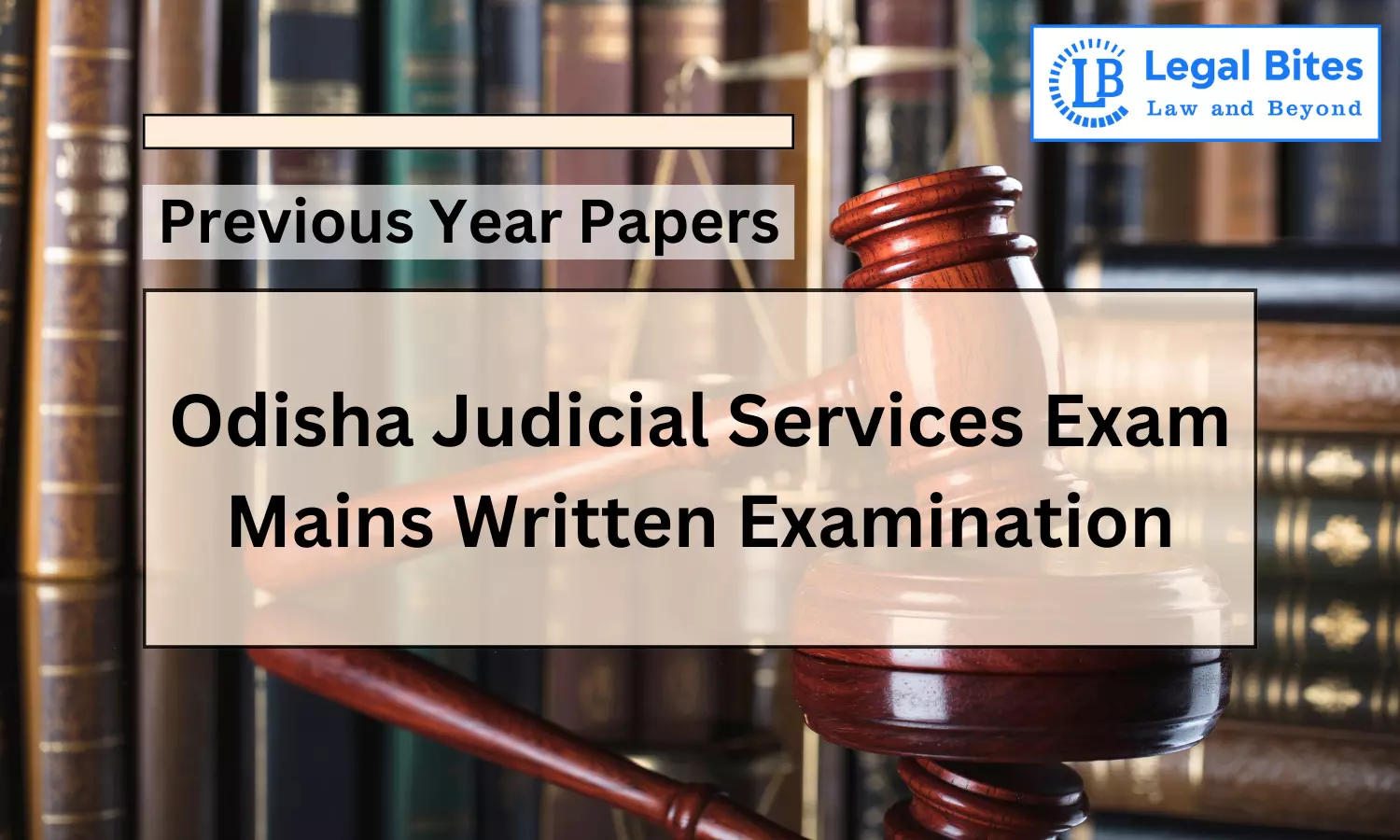Odisha Judicial Services Exam Mains 2023 Paper II | Procedural Law
Candidates preparing for Odisha Judicial Services Exam should solve the Odisha Judicial Services Exam Mains 2023 Paper II | Procedural Law

Candidates preparing for the Odisha Judicial Services Exam should solve the Odisha Judicial Services Mains 2023 Paper II (Procedural Law) and other previous years' question papers as part of their preparation for the Prelims and Mains. Practicing these papers helps aspirants understand the syllabus better and prepare strategically by focusing on the types of questions previously asked. Successful candidates are always aware of the question patterns and techniques employed by the Odisha Judiciary Examination. Every aspirant should adopt this approach at the start of their preparation to gain a comprehensive understanding of the examination pattern and question design.
Odisha Judicial Services Exam Mains 2023 Paper II | Procedural Law
Practicing authentic question papers gives candidates a real sense of the exam pattern and question style. Below is the Odisha Judicial Services Mains 2023 Paper II (Procedural Law). Strengthen your preparation with our Odisha Judiciary Mains Mock Test Series.
Odisha Judicial Services Main Written Examination 2023
Paper-II (Procedural Law)
Paper-II (Procedural Law)
Time Allowed: 2 hours 30 minutes
Maximum Marks: 150
Specific Instructions:
The figures in the right-hand margin indicate Marks.
Answer six questions, selecting two questions from each Section.
All questions carry equal marks
Question 1
(a) Explain the term injunctions'. Under what circumstances, court may order temporary injunctions? Discuss. (15 Marks)
(b) Write a note on inherent powers of the court under CPC. (10 Marks)
Question 2
(a) Describe in detail, the basic principles of pleadings. Under what circumstances, can a court strike out pleadings? Describe the procedure for amendment of pleadings. (15 Marks)
(b) Explain the provisions relating to suits by/in case of minors safeguarding their interests. (10 Marks)
Question 3
(a) X field a suit for possession of certain land alleged to have fallen to his share on partition of joint family property with Y. Defendent raised a plea that family property has not been divided. The suit was dismissed giving findings that partition has not been affected. Later X sued Y for partition of joint family property. Decide the plea of res judicata raised by Y. (10 Marks)
(b) Husband H filed suit against wife W restraining her from interfering with the possession of house. Plea of ownership to suit house was substantially involved but it was not raised by husband H. Suit was dismissed in view of settlement which had already been arrived before Village Panchayat where H had relinquished his right in house in favour of wife W and her children Finding was not challenged and attained finality. H then sold house to T who filed a suit for declaration of title and possession against W. Is suit by T barred by principle of res judicata? (10 Marks)
(c) Point out the differences between Res Judicata and Estoppel. (5 Marks)
Question 4
(a) Discuss the provisions and procedure relating to institution of suit by or against Government under Code of Civil Procedure. (10 Marks)
(b) What is interpleader suit? When and by whom can it be instituted? (10 Marks)
(c) Who is an indigent person? What is the mode of instituting suit by such persons? (5 Marks)
Section B
Question 5
(a) What do you understand by 'plea bargaining'? State the procedure for initiating plea-bargaining in the court. (10 Marks)
(b) Discuss the constitutional and statutory rights of arrested persons. (15 Marks)
Question 6
(a) Discuss the provisions relating to bail as contained in the Code of Criminal Procedure, 1973, Can bail be claimed as a matter of right even in non-bailable cases? Explain. Also explain, what is default bail. (15 Marks)
(b) Write a short note on anticipatory bail. (10 Marks)
Question 7
(a) Every offence shall ordinarily be inquired into and tried by a court within whose jurisdiction it was committed." Explain. Also discuss exceptions to this rule, if any. (15 Marks)
(b) A is travelling from Delhi to Bombay by train. During the night his suitcase is stolen. The theft is discovered at Bombay. B is caught with stolen suitcase at Jaipur. Where can B be tried for the theft? Discuss with justification. (10 Marks)
Question 8
(a) What is FIR and how is it recorded? State its importance and its evidentiary value. What is the effect of delay in lodging FIR? (15 Marks)
(b) Write a note on preventive action of police. (10 Marks)
Section C
Question 9
(a) Write a detailed note on privileged communication under the provisions of Indian Evidence Act, 1872. (15 Marks)
(b) A went to a lawyer B and stated that he (A) had committed murder of C and he wanted to engage him as his defence lawyer. B replied he will not defend his case rather he will give evidence against him (A) that he had confessed his crime before him. Can B be allowed to depose against A? (5 Marks)
(c) Write a note on interested witness. (5 Marks)
Question 10
(a) Write a detailed note on 'Best Evidence Rule' under Indian Evidence Act, 1872. (15 Marks)
(b) Write notes on patent and latent ambiguities. (10 Marks)
Question 11
(a) What is dying declaration? When is it admissible in evidence? Discuss its evidentiary value. (15 Marks)
(b) A who was hit by a bullet stated in the hospital in the presence of Magistrate that B fired at him. A did not die of this injury. Is the statement of A admissible in evidence against B? Can it be of any other use? Discuss. (10 Marks)
Question 12
(a) Define motive. How far motive, preparation and conduct of a party are relevant? (10 Marks)
(b) What is plea of alibi? On whom lies the burden of proof in case of plea of alibi? (5 Marks)
(c) Point out the differences between judicial confession and extrajudicial confession. (10 Marks)

